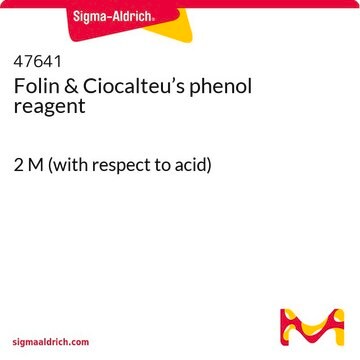27645
Gallic acid monohydrate
≥99% (HPLC)
Synonym(s):
3,4,5-Trihydroxybenzoic acid monohydrate
Sign Into View Organizational & Contract Pricing
All Photos(1)
About This Item
Recommended Products
Quality Level
Assay
≥99% (HPLC)
form
solid
impurities
7-12% water (Karl Fischer)
ign. residue
≤0.1% (as SO4)
mp
252 °C (dec.) (lit.)
anion traces
chloride (Cl-): ≤200 mg/kg
sulfate (SO42-): ≤100 mg/kg
SMILES string
OC(=O)c1cc(O)c(O)c(O)c1
InChI
1S/C7H6O5/c8-4-1-3(7(11)12)2-5(9)6(4)10/h1-2,8-10H,(H,11,12)/p-1
InChI key
LNTHITQWFMADLM-UHFFFAOYSA-M
Looking for similar products? Visit Product Comparison Guide
General description
Gallic acid monohydrate is a phenolic acid. It is a planar molecule with two intramolecular hydrogen bonds and five intermolecular hydrogen bonds.
Application
Gallic acid monohydrate can be used as a reducing agent to synthesize Tin oxide (SnO2) nanoparticles via the precipitation method using stannous chloride as a precursor salt.
Storage Class Code
11 - Combustible Solids
WGK
WGK 2
Flash Point(F)
482.0 °F - closed cup
Flash Point(C)
250 °C - closed cup
Personal Protective Equipment
dust mask type N95 (US), Eyeshields, Gloves
Choose from one of the most recent versions:
Already Own This Product?
Find documentation for the products that you have recently purchased in the Document Library.
Customers Also Viewed
Ante Lončarić et al.
Foods (Basel, Switzerland), 9(1) (2020-01-17)
Micro matrix solid phase dispersion (micro-MSPD) was optimized by response surface methodology for the extraction of polyphenols from the peel of twelve traditional and eight commercial apple varieties grown in Croatia. The optimized micro-MSPD procedure includes the use of 0.2
Claudriana Locatelli et al.
Bioorganic & medicinal chemistry, 16(7), 3791-3799 (2008-02-26)
Gallic acid and gallates with the same number of hydroxyl groups and varying the length of the side carbon chain, with respective lipophilicity being defined through the ClogP values, were examined for their ability to induce apoptosis (through the DNA
Giuliano E Pereira et al.
Frontiers in plant science, 11, 707-707 (2020-07-01)
Girdling is a traditional horticultural practice applied at fruit set or other phenological stages, and is used mostly as a vine management. In grapevines, it is used primarily for table grapes to improve berry weight, sugar content, color, and to
Ulyana Muñoz Acuña et al.
Journal of natural products, 73(11), 1775-1779 (2010-10-30)
Two new polyisoprenylated benzophenones, 32-hydroxy-ent-guttiferone M (1) and 6-epi-guttiferone J (2), along with seven known compounds, 6-epi-clusianone (3), guttiferone A (4), xanthochymol (5), guttiferone E (6), isoxanthochymol (7), (+)-volkensiflavone (8), and (+)-morelloflavone (9), were identified from the seeds and rinds
Kristina Habschied et al.
Foods (Basel, Switzerland), 9(2) (2020-02-28)
Antioxidative molecules, such as polyphenols can preserve and prolong the freshness of packaged beers. The aim of this work was to assess the content of polyphenolic compounds (by Folin-Ciocalteu and standard European Brewery Convention method) in different types of industrially
Our team of scientists has experience in all areas of research including Life Science, Material Science, Chemical Synthesis, Chromatography, Analytical and many others.
Contact Technical Service







